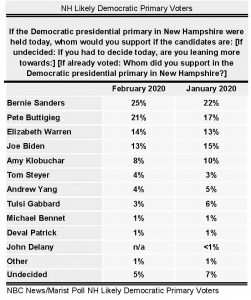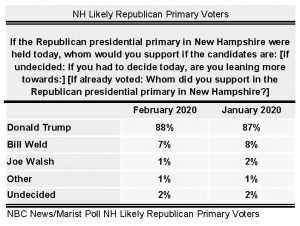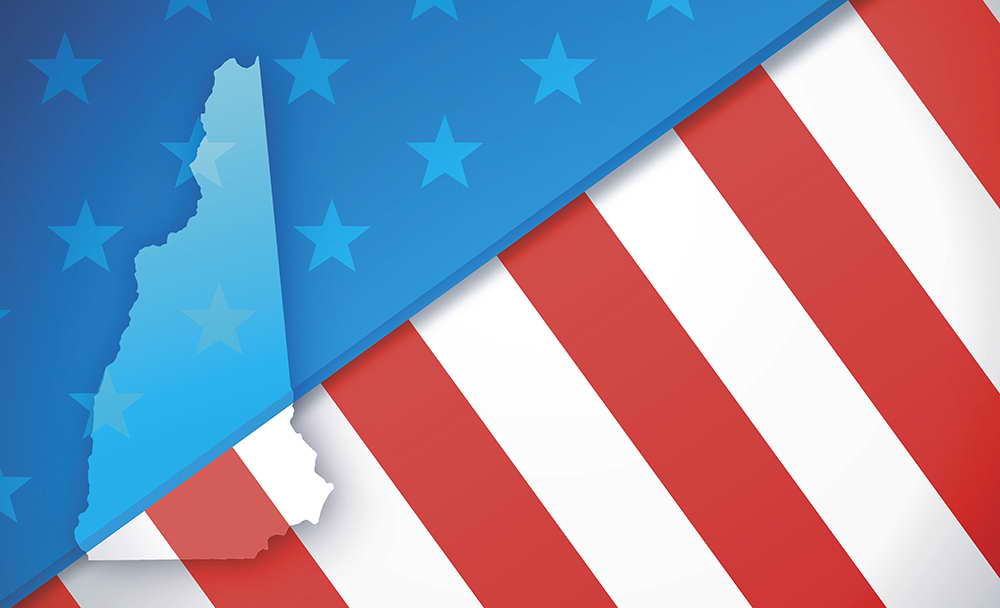February 7, 2020
New Hampshire Primaries, Feb 7, 2020
NBC News/Marist Poll
Sanders Edges Buttigieg in New Hampshire
As the clock ticks down to the New Hampshire primary, Bernie Sanders (25%) has a narrow advantage over Pete Buttigieg (21%) among likely Democratic primary voters statewide including those who are undecided yet leaning toward a candidate or who have already voted. Both Sanders and Buttigieg have gotten a slight boost post Iowa. In the NBC News/Marist Poll in the state in January, Sanders received 22% to Buttigieg’s 17%. The next two candidates Warren (14%) and Biden (13%) receive about the same support as they did last time.
“It’s a close race which still has more than one in five persuadable voters, a notable proportion,” says Dr. Lee M. Miringoff, Director of The Marist College Institute for Public Opinion. “But, Sanders and Buttigieg have picked up the pace. One significant change from January is that Buttigieg’s support has really solidified, although Sanders still commands the most loyal following.”

Sanders (41%) has a commanding lead among Democrats and Democratic-leaning independents who identify as progressive. Elizabeth Warren, his closest competitor among this group receives 22% followed by Buttigieg with 15%. Among those who identify as moderate, Buttigieg (30%) is +8 points over Biden (22%). Biden (26%) and Butigieig (24%) were in a statistical tie in last month’s survey. Klobuchar currently receives 15% among this group.
Sanders (35%) outpaces his rivals among likely Democratic voters under the age of 45. 18% of these voters support Warren, and 17% are for Buttigieg. Of note, more than four in ten members of Millennials and Gen Z (42%) are for Sanders. Among likely Democratic voters over the age of 45, Buttigieg (24%) is ahead of Sanders (18%) and Biden (16%).
Sanders (28%) has a double-digit lead over his closest competitor, Buttigieg (18%), among men. Buttigieg (24%) and Sanders (22%) are competitive among likely Democratic primary voters who are women.
62% of likely Democratic primary voters with a candidate preference, up from 56% previously, strongly support their choice of candidate. Supporters of Sanders (73%) are most enthusiastic. Buttigieg enjoys a boost. 63% of those in Buttigieg’s camp, up from 44% previously, say they strongly support him. 60% of Biden backers say they will not waiver in their commitment. This is up slightly from 56%. A majority of those who are currently for Warren (56%) are firmly committed to her compared with 53% in January.
Half of likely Democratic primary voters (50%) say it is more important to have a nominee who has the best chance of defeating President Donald Trump in November than to have a nominee who is closest to them on the issues (42%). Not surprisingly, 58% of Democrats likely to vote in the primary say their priority is electability. In contrast, 51% of independents likely to cast a ballot in the Democratic primary believe it is more important to nominate a candidate who aligns with their views on the issues.
Among those who favor electability, Buttigieg (23%) and Biden (20%) are competitive. Sanders has 19% to 13% for Warren and 10% for Klobuchar. Sanders (30%) leads Buttigieg (20%) by 10 points among those who consider positions on the issues to be more important. Warren is the only other candidate who receives support in double digits (15%) among these voters.
On the Republican side, Trump trounces his primary opponents. Among likely Republican primary voters including those who are undecided yet leaning toward a candidate or who have already voted, Trump (88%) outpaces Bill Weld (7%) and Joe Walsh (1%).

More than three in four likely Republican primary voters with a candidate preference (85%) say they strongly support their choice of candidate.
President Trump’s approval rating in New Hampshire is underwater. 44% of adults approve of his job performance. This includes 31% who strongly approve of how he is doing his job. A majority (51%) disapprove, including 43% who strongly do so. When last reported, 42% of New Hampshire adults approved of how the president was doing in office, and 52% disapproved.
New Hampshire registered voters divide about whether they prefer a Congress controlled by Republicans (45%) or Democrats (44%). Democrats (47%) had an advantage over Republicans (42%) in January.

